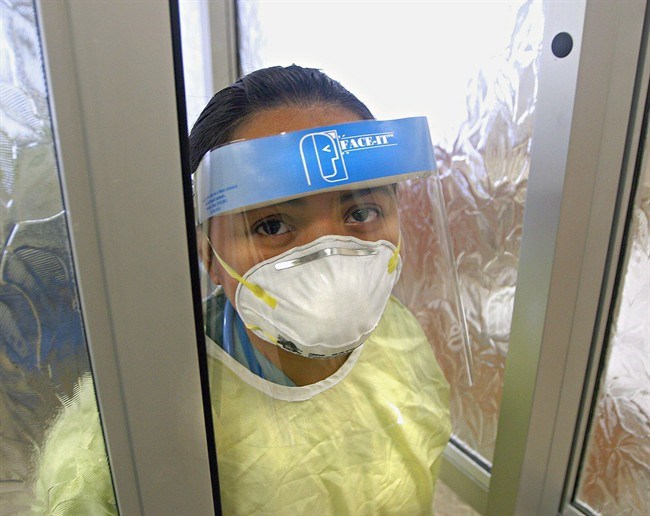
A nurse walks out of a patient isolation room at Mount Sinai Hospital in Toronto, on Friday, March 18, 2005 as she demonstrates isolation procedures. The auditor general is urging the federal government and Canada's public health authorities to get serious about the growing threat of drug-resistant infections. THE CANADIAN PRES/Nathan Denette)
Republished April 28, 2015 - 3:27 PM
Original Publication Date April 28, 2015 - 7:10 AM
TORONTO - A knuckle-rapping report on federal government inactivity on the subject of antibiotic resistance is earning praise from experts.
The report, issued Tuesday by auditor general Michael Ferguson, said the Public Health Agency of Canada and Health Canada have done too little to address the threats to these precious drugs, which allow doctors to perform medical feats that would be inconceivable without them.
Experts have warned that if the world were to return to a time when few tools were available to counteract infections, the surgical advances of the 20th and 21st century would be too dangerous to undertake.
Antimicrobial resistance can develop naturally. But misuse and overuse of antibiotics creates situations in which infections that could easily be treated a couple of decades ago can now only be cured with longer and costlier courses of antibiotics, some of which carry the risk of serious side-effects.
Ferguson's report said the government agencies "have not fulfilled key responsibilities to mitigate the public health risks" posed by the spread of antimicrobial resistance in Canada.
Further, Health Canada has left open major loopholes that allow unchecked use of antibiotics in the food animal production sector, while the Public Health Agency has failed to mobilize provincial and territorial counterparts to develop a national strategy for dealing with the growing problem.
"The Public Health Agency has identified that there has to be stronger national leadership. Well, a lot of that stronger national leadership has to come from the Public Health Agency itself. They have to get those provinces on board," Ferguson said at a news conference.
"But right now given that most of the work is happening within the federal family, it's hard to see how we'll ever have a comprehensive, pan-Canadian strategy for many years to come."
A statement from the office of federal Health Minister Rona Ambrose said the government accepts the recommendations of the report and will build on the "significant steps" it has already taken on the issue of antibiotic resistance.
But human and animal health experts who have been calling for more action for years concur with Ferguson's report that federal leadership has been lacking.
"We've been talking about it for a long time but there's been precious little action. And in particular, very little action at the .... federal level," said Dr. Andrew Simor, head of microbiology at Toronto's Sunnybrook Health Sciences Centre.
"One of our challenges, especially where you need a national strategy, is how you get the federal government to be able to work effectively with 10 provinces and a number of territories? And certainly on this portfolio, it hasn't happened."
Ferguson's audit found that incomplete surveillance has left the agency without a comprehensive national picture of the resistance problem. There is limited information on drug-resistant infections at clinics and long-term care facilities, and few details about the extent of the problem in remote areas and among vulnerable members of the population, the report said.
The audit also criticized Health Canada for not taking some important steps to promote the prudent use of key antimicrobial drugs in food animal production. In particular, it pointed to the ongoing ability of farmers to import antibiotics and the active pharmaceutical ingredients of the drugs for use in their own animals without prescriptions.
The report notes several European countries — Norway, Denmark, the Netherlands, Sweden and Britain — only allow antibiotics to be used in animals when prescribed by a veterinarian.
"With the existence of those two loopholes, then it's meant that Canada doesn't really have a regulated system for antibiotic use in animals," said veterinarian John Prescott, who was on a Health Canada committee that recommended 13 years ago that these practices be disallowed.
Prescott, who retired last year from the Ontario Veterinary College in Guelph, Ont., said it is a mystery to people working in this field why those loopholes still exist.
"I think it probably relates to lobbying."
A federal action plan on antimicrobial resistance and use that was released late last month said Health Canada will "address" the so-called own-use importation of veterinary antibiotics, though it does not state what action will be taken.
"Well, I hope they're going to close them down," said Prescott, who added that while the scale of antibiotic use related to those loopholes isn't known, "it's thought to be significant."
Eric Brown, who holds a Canada research chair in microbial chemical biology biology at McMaster University in Hamilton, said the country should disallow the use of antibiotics in animal feed, full stop. Antibiotics are used as growth promoters in some agricultural operations.
"We should just stop using antibiotics in animal feed. If that's the only way we can industrially farm, maybe we need some innovation in farming," Brown said.
News from © The Canadian Press, 2015